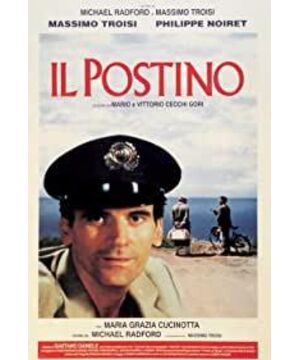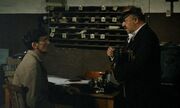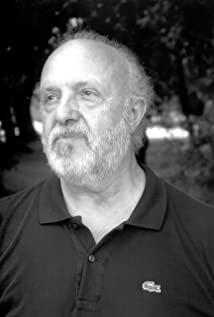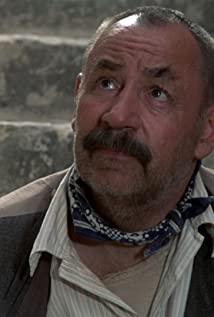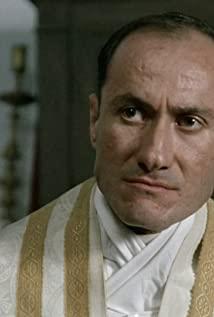Bergman's Virgin Spring flows with the sins and absurdities of God's benevolent time; Hou Hsiao-hsien's youth is full of beauty and heaviness; Kurosawa sympathetically writes his own story, from life to death; Antonioni completes His own artworks are as subtle as the greatest writers are creating his novels; and Almodovar, Abbas...
Is the film not up to the height that literature can express? For pure writers, language is not for simple functions, but for the expression of life. For real filmmakers, light and film films are not for the entertainment of the public, but for a world beyond, a life or death, aesthetic or Cruel, insignificant or great, fleeting or immortal, there is no "or", no talk, only a peaceful fade in and out, gently without taking away any tears of sympathy, nor leaving behind a little clinging to the so-called truth of meaning.
The best combination of literature and film is The Postman. Massimo Troisi starred in the film himself, maybe he didn't know what the script meant to him, he just wanted to do it. I think this is what Neruda touched him—a Chilean poet or Nobel Prize winner, the 1960s and 1970s, and his exile and wandering inspired the original creator to think about poetry, literature and life. And the story begins with that unnamed island in Italy.
Mario (Massimo Troisi) is the son of a fisherman. He doesn't like the sea, but he became a postman, specializing in sending letters on the island. The island is home to the exiled Chilean poet Neruda and his wife. He is good at writing poetry and is very talented. Mario sent and received many letters from Neruda every day. In frequent contacts, Mario became more and more admired for this poet. He was keen to discuss poetry with Neruda and study poetry. After falling in love with the beautiful girl on the island, Mario often confided in Neruda, and eventually moved the girl's heart with poetry. Until Neruda left the island, Mario still held on to his love of poetry. He continued to write poetry, and was about to read it at a workers' meeting, but met with disaster.
everything is a metaphor
From Mario's question, "You said, is everything in this world a metaphor?" Poetry actually turns the wheel of fate without a trace, and will change a postman's life.
"What's the sky crying about. It's raining." " Explain
, and poetry becomes boring."
"How to be a poet. Take a walk along the sea and pay attention to everything around you.
"
The smell makes me tired of being a human being."
"Poems don't belong to the authors but to those who need them." "The tongue is not just
for licking stamps, but for expressing ideas, about life."
Flowing down, the dialogue between the postman and the poet seems to never end. The waves beat against the rock walls, the small slopes covered with flowers and plants on both sides of the white cliff, the postman riding a bicycle every morning, the white house on the hill, knocking on the fence, handing out a thick stack of letters, the poet put it down The yellowed pages went to the door of the small courtyard. Sending letters has become the whole meaning of the postman's daily life. As he approaches a poet, he gradually approaches his long-buried pursuit. In the past life, Mario became a person no different from the illiterate fishermen on the island, but at least he still had despair, a person without hope in despair. And when for the first time, the poet sat side by side with the postman on the beach, a poem about the waves gave Mario's life the rhythm that danced like a poem.
The boat washes over my words, is everything in the world a metaphor? Clouds, sky, sea, and even life. The poet could not answer this question, but for the postman, this feeling was enough to change his world.
Your smile unfolds like a butterfly flapping its wings
in love.
Love is the sea breeze on the island kissing the sea, the wind passing through the woods, Neruda and his wife's early morning hugs and greetings, Mario staring at Beatrice for ten minutes from the bar seat.
Love has become the driving force behind the postman's desire to write poetry. He opened the collection of poems that the poet gave him and wrote down this sentence:
Your smile spreads like a butterfly flapping its wings.
He stood by the beach in the sunset, singing the poem to Beatrice:
I Like For You to be Still
I like for you to be still: it is as though you were absent,
distant and full of sorrow as though you had died .
One word then, one smile, is enough.
And I am happy, happy that it's not true.
I like that you are quiet:
as if you were gone
, thousands of miles away, full of mourning,
as if you were no longer
alive at that time, A word, a smile, is enough
And I'll be happy, happy
because it's not real
As if no girl can escape such a net, he casts a net of poetry and captures Beatrice's heart , even though this web was woven for him by Neruda, this was the first time Mario had truly felt the waves in his life, something as silent as stagnant water quietly changed, no just poetry.
The movie here, too, has a clever metaphor, and one of my favorites among them is Beatrice. It's not a simple girl's name. When the poet heard the postman tell him that he liked the girl's name is Beatrice, the poet said another name: Dante.
"Dante Alighieri. He fell for a certain Beatrice, Beatrice have inspired boundless love."
The significance of Beatrice to Dante goes beyond "The New Life" and "The Divine Comedy". The beautiful life that Dante loved, who fell at the age of 23, is the incarnation of the angel and muse who symbolizes pure love in his heart in "The New Life". Undying love wrote "The Divine Comedy" - in "The Divine Comedy" she became a fairy, through her power from purgatory to heaven. In the movie, Beatrice is not an existence of such a belief. In Mario's life, he wrote a new life for him with love, and awakened his life with the love and light of women.
Only when you know Dante can you understand what Beatrice means in The Divine Comedy. Only when you understand Beatrice in the movie can you understand the radiant life of Mario the Postman. Such a metaphor might as well be the director's desire for a belief like Beatrice. After all, each of us aspires to embark on the road of rebirth led by faith. The universal feelings contained in the movie are thus interpreted by the name of a beautiful girl without revealing its value.
Conclusion: An Elegy
For me, the most fascinating part of the film is the unknown ending.
At the very beginning, we mentioned that Mario was going to read a poem at the workers' meeting but it was a disaster. Here, I don't want to waste my ink on any political rhetoric, although Neruda said he was going to write poetry for those who were suffering.
Death does not earn tears of compassion, just as the greatest shock does not necessarily end in tragedy. Mario's death brought the poet Neruda back from Chile to that seaside island. This time, it was still in such a light tone, and the most exciting part of the whole movie started quietly.
Beatrice kept the tape recorder that was supposed to be returned to Chile, as a memorial, no need to mention this detail. Then, the poet strolled along the beach, the background music played, and the monologue of the low male voice uttered the first poem in Mario's life. This is what he recorded on the tape recorder for the poet Neruda. The question that he could not answer at first - the beauty of the island - finally found the answer in the gradual progress of life. Let me record all the beautiful voices for you, do you hear them?
"First, the sound of the waves in the bay, soft; second, the sound of the waves, loud; third, the sound of the wind over the cliffs; fourth, the wind through the bushes; The sixth, the sad bells of the church; the seventh, the starry night sky on the island, which I have never felt so beautiful; the eighth, the sound of my son's heartbeat. "
Italian beauty doesn't even dare to show sadness.
I can't make a good ending for my feelings. For me, the film often transcends meaning. It reminds me of a postman who saw real beauty. , a poet who penetrates the soul of poetry, a friendship, despair and hope. It makes me fall in love with poetry, evokes the most ordinary emotions of the most ordinary people, the beauty of poetry, and the beauty of movies.
Finally, let Let's not forget the music behind every passage of the movie, without Perlman's moving violin, this sad and beautiful elegy would not flow out.
View more about The Postman reviews


